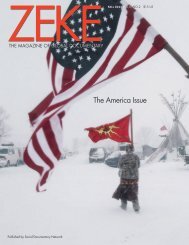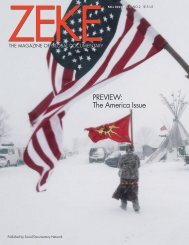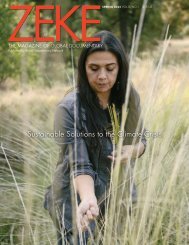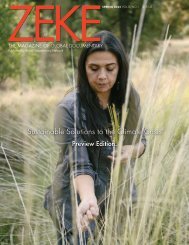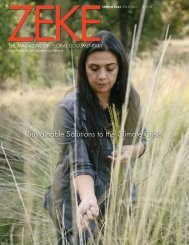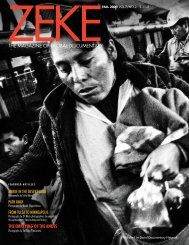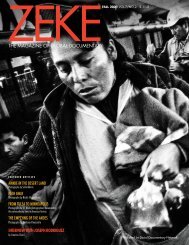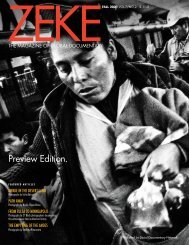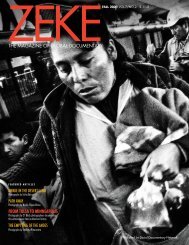ZEKE Magazine: Spring 2023.2
Feature articles on Ecuador by Nicola Ókin Frioli; Ethiopia by Cinzia Canneria, and Ukraine by Svet Jacqueline. Contents: Piatsaw:A Document on the Resistance of the Native Peoples of Ecuadorian Amazon Against Extractivism Photographs by Nicola Ókin Frioli Winner of 2023 ZEKE Award for systemic change Women's Bodies as Battlefield Photographs by Cinzia Canneri Winner of 2023 ZEKE Award for documentary photography Too Young to Fight, Ukraine Photographs by Svet Jacqueline Picturing Atrocity: Ukraine, Photojournalism, and the Question of Evidence by Lauren Walsh Interview with Chester Higgins by Daniela Cohen
Feature articles on Ecuador by Nicola Ókin Frioli; Ethiopia by Cinzia Canneria, and Ukraine by Svet Jacqueline.
Contents:
Piatsaw:A Document on the Resistance of the Native Peoples of Ecuadorian Amazon Against Extractivism
Photographs by Nicola Ókin Frioli
Winner of 2023 ZEKE Award for systemic change
Women's Bodies as Battlefield
Photographs by Cinzia Canneri
Winner of 2023 ZEKE Award for documentary photography
Too Young to Fight, Ukraine
Photographs by Svet Jacqueline
Picturing Atrocity: Ukraine, Photojournalism, and the Question of Evidence
by Lauren Walsh
Interview with Chester Higgins
by Daniela Cohen
You also want an ePaper? Increase the reach of your titles
YUMPU automatically turns print PDFs into web optimized ePapers that Google loves.
Picturing Atrocity
MORAL PRESSURE
But the photojournalistic work
operates on many levels. In addition
to their potential evidentiary worth,
Douglas sees photos as uniquely
powerful in inciting an emotional
response—a moral outrage—that
presses for legal action. “We have
these images coming out of Ukraine,
for instance, the pregnant woman
who was injured by the rocket attack
[in Mariupol] and ended up dying
and losing the fetus. That had an
incredibly galvanizing capacity in
ways that words simply don’t—and
that can actually lead towards
mobilizing the necessary political will
to create war crimes trials.”
Yet the moral pressure on the
public also comes with a toll on
the frontline witnesses. Maxim
Dondyuk, a Ukrainian documentary
photographer who has observed
scenes of war crimes, says, “There
were a lot of things that broke me
down.” Kochetova confirms, “this has
been traumatizing. It’s personal. It
will affect me for decades.”
Dondyuk expresses a bigger
picture outlook: “For me, the
whole war is already a crime.”
He reiterates the point that photojournalists
are not investigators: “It’s
not my job. Yes, I have witnessed
war crimes and took as many photos
as could, but it’s not my role to dig
into that.” That is for prosecutors to
take up.
Alison Fitzgerald Kodjak, Acting
Global Investigations Editor with
the AP, makes a related point. She
has helped to head up War Crimes
Watch Ukraine, a joint project of
the AP and the PBS investigative
documentary series FRONTLINE,
that catalogs incidents of apparent
IHL violations. Influenced by, as she
says, “the flood of images” out of
Ukraine in the early days of the war,
Fitzgerald Kodjak and colleagues
developed this database—which
works with significant numbers
First responders and volunteers carry an injured pregnant woman from a maternity hospital that was damaged
by Russian shelling in Mariupol, Ukraine, March 9, 2022. The woman and her baby later died. © Evgeniy
Maloletka/AP.
of photos but also other forms of
evidentiary records—to increase
public understanding. And while
Ukrainian prosecutors as well
as international law researchers
have expressed interest in the
documentation amassed, Fitzgerald
Kodjak is clear in stating, “this is
a journalistic enterprise. We aren’t
working to meet legal definitions.” In
short, there is a gap—one protected
as well as respected by many in the
field—between journalism and legal
application.
Even so, though he has no
experience with tribunals, Maloletka
nevertheless hopes his images may,
one day, provide a frontline view
that can hold Russian perpetrators
accountable in a court of law.
Ultimately, Dondyuk says, “I
hope that people not only see these
pictures, but feel it for themselves,
tear themselves from their cup of
coffee or glass of wine in their warm
refined world.” In short: Ignorance
and impunity are unacceptable.
THE FUTURE
The collection of evidence for potential
use in tribunals is set to outpace, by
an order of magnitude, the evidence
“I hope that people not only see these pictures, but feel
it for themselves, tear themselves from their cup of coffee
or glass of wine in their warm refined world.”
—Maxim Dondyuk, Ukrainian documentary photographer
amassed in Syria. As Betts says,
“you have the technology to collect
information, the political will to act on
that information, and the capacity of
society to assist this process.” The pace
will also be faster. Historically, such
trials could take years, even decades,
to come to fruition. We are now likely
to witness prosecutions that feel closer
to “real time.”
And as Dondyuk states of his current
work, “I’m not a war photographer.
When the war in Ukraine is over, I will
return to my artistic projects not related
to war, and definitely won’t continue
covering conflicts in other countries.
But this is my country now and I feel
that this is my duty to capture this
historical moment for the present and
the future.”
With gratitude to all in this essay who
gave time for an interview or allowed use
of imagery.
54 / ZEKE SPRING 2023








